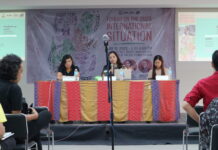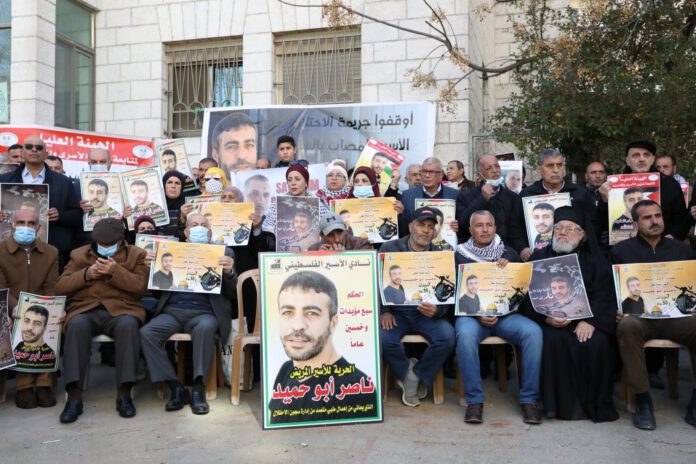Palestinian prisoner Nasser Abu Hmaid is in a coma fighting lung cancer as he remains separated from his loved ones. Abu Hmaid has been held in intensive care in Barzilai hospital for four days. However, his health condition has been deteriorating for a long period of time, while the Israeli occupation refused to transfer him to a civilian hospital. Samidoun Palestinian Prisoner Solidarity Network demands the immediate release of Nasser Abu Hmaid and full accountability for the ongoing and systematic policy of medical neglect that threatens the lives of imprisoned Palestinian strugglers.
Abu Hmaid. 49, is sentenced to 7 life sentences and 50 years in Israeli prisons; his four brothers, Nasr, Sharif and Mohammed, were arrested with him in 2002, while his fifth brother, Islam, was arrested in 2018. All are serving life sentences for their participation in the resistance to Israeli occupation and Zionist colonialism throughout Palestine. Their sixth brother, Abdel-Moneim Abu Hmaid, was assassinated by Israeli occupation special forces on 31 May 1994.
The Abu Hmaid family, Palestinian refugees from al-Amari refugee camp near Ramallah, have been for years a symbol of Palestinian resistance and sacrifice; their home was demolished by the Israeli occupation on five separate occasions as an act of collective punishment and rebuilt each time. Their mother was denied family visits for many years by the Israeli occupation. Abu Hmaid’s mother and siblings have spoken out repeatedly and regularly participate in all activities in defense of Palestinian prisoners and their liberation.
Not only is Nasser Abu Hmaid fighting lung cancer; his lungs shut down due to a bacterial infection, acute inflammation and pneumonia. Last October, he received surgery to remove a cancerous tumor in his lung; however, he was returned to prison before he could fully recover. Palestinian prisoners’ associations report that his access to regular chemotherapy was postponed on multiple occasions since that time. After his surgery, his condition worsened instead of improving.
Today, Abu Hmaid is in a coma, on a ventilator, as he struggles to survive. His family and lawyers have repeatedly noted that up-to-date medical reports are not available, and both his family members and lawyers have been barred from seeing him in the hospital, even as he remains unconscious. His imprisoned brothers have been given little to no information about his situation.
 His family point to ongoing medical neglect in Abu Hmaid’s case. His lung cancer was only detected in August 2021 despite already reaching an advanced stage. The surgical procedure was delayed until October, when he received surgery due to the protests of his fellow prisoners and legal organizations.
His family point to ongoing medical neglect in Abu Hmaid’s case. His lung cancer was only detected in August 2021 despite already reaching an advanced stage. The surgical procedure was delayed until October, when he received surgery due to the protests of his fellow prisoners and legal organizations.
Protests and solidarity tents have been set up throughout occupied Palestine to support Abu Hmaid throughout occupied Palestine, even as his mother was herself hospitalized in Ramallah on 10 January due to the ongoing trauma of the situation. These demonstrations are demanding Abu Hmaid’s immediate release and that of all of the sick and elderly prisoners being denied proper medical care and connection with their loved ones behind the bars of the Israeli occupation.
Palestinian prisoners have repeatedly denounced a systematic policy of medical neglect by the Israeli occupation against them behind bars. At least 73 of the 227 Palestinians who have lost their lives behind Israeli bars suffered from medical neglect and negligence. There are over 500 sick prisoners among the 4,500 Palestinians jailed in Israeli occupation prisons. These include 200 prisoners with chronic illnesses, at least 10 with active cancer and 85 with a number of serious disabilities and illnesses. 25 Palestinian political prisoners with particularly severe illnesses are held in the Ramle prison clinic, notorious among imprisoned Palestinians for its poor care.
Medical neglect includes the denial of regular medical checkups, delay of treatment or testing, being provided with painkillers instead of proper treatment, poor sanitary conditions and overcrowding in the prisons, infestation with insects and rodents in the prisons, transfers on the “bosta” rather than in ambulances or medical vehicles, lack of supports or medical equipment for prisoners with disabilities, and other forms of mistreatment. Women prisoners are not provided with access to specialized gynecological care. All of these are practiced as a standard policy of the Israeli occupation, amounting to another form of physical and psychological ongoing torture against Palestinian prisoners and detainees.
Under the Fourth Geneva Convention and the Standard Minimum Rules for the Treatment of Prisoners, Israeli occupation prison authorities have a responsibility to provide proper health care without discrimination, to provide suitable premises and access to qualified medical professionals. However, the Israeli prison system, part of the mechanisms of the colonial occupation that aims to suppress and break the Palestinian resistance, violates these responsibilities as a matter of course.
The case of Nasser Abu Hmaid and his fellow ill prisoners is not only a humanitarian outrage but an example of the ongoing attempts to criminalize and isolate the Palestinian resistance through all forms of repression and violence. The “policy of slow death” or “slow killing” through medical negligence is a systemic practice that has been repeatedly identified by the Palestinian prisoners’ movement as a key target of struggle.
Abu Hmaid became active in the great Palestinian intifada of 1987. He joined groups of youth confronting occupation soldiers and settlers. Arrested in 1990 by the Israeli occupation, he was sentenced to life imprisonment before being released in 1994 after the signing of the Cairo Agreement. He continued to resist Israeli colonialism and, along with his brothers, participate actively in the armed resistance and was arrested with his brothers once again in 2002. He was a leader of the Al-Aqsa Martyrs’ Brigades, the armed organization of the Fateh movement, in the occupied West Bank of Palestine.
During his time in the occupation prisons, he has repeatedly participated in collective hunger strikes and protest actions in defense of his fellow Palestinian prisoners. His words from the 2017 collective hunger strike continue to reverberate: “We are still pounding on the cell doors, loudly shouting, chanting and defying the jailer, his brutality and criminality. We still breathe freedom and pride. We walk to death smiling, and we sit on a black blanket, all they left us, around a glass of water and a pinch of salt. We sing for the homeland and for the coming spring of victory. Do not ask about our bodies, for they betrayed us and collapsed for days. As for our souls and our will, we assure you that they are fine, steadfast as the rock in Ebal and Galilee. We took an oath to continue until victory or martyrdom, the path to freedom and independence.”
Nasser Abu Hmaid is among 4,600 Palestinian political prisoners resisting on the front lines for justice and liberation, struggling relentlessly with an unbreakable will toward freedom. We urge all supporters of Palestine to take action to call for freedom for Abu Hmaid and all Palestinian prisoners, especially the ill prisoners who continue to face systemic medical neglect and “slow killing.”
Join Samidoun Palestinian Prisoner Solidarity Network and organizers for justice and liberation in Palestine around the world for the International Week of Action to Free Ahmad Sa’adat and all Palestinian Prisoners, 15 January to 22 January 2022.
- Organize events, actions and protests to demand freedom for Ahmad Sa’adat, Nasser Abu Hmaid and all Palestinian prisoners! Protest in public squares, campuses and community spaces for the Palestinian prisoners. Organize a Palestine Stand or a letter writing event to write to Sa’adat and his fellow Palestinian prisoners Email us at [email protected] to inform us about your events or actions.
- Boycott Israel! Ahmad Sa’adat says: “I call on all forces of progress, freedom and democracy to stand by the struggle of our people through all forms of boycott: political, economic, academic and cultural of the occupation state and the creation of a real economic cost for its industries of colonization and settlement and escalating the global campaigns for boycott of all corporations that support and invest in the occupation militarily and economically.” Don’t buy Israeli goods, and campaign to end investments in corporations that profit from the occupation. Join direct actions to challenge war profiteers and boycott complicit corporations like Puma and HP.


















